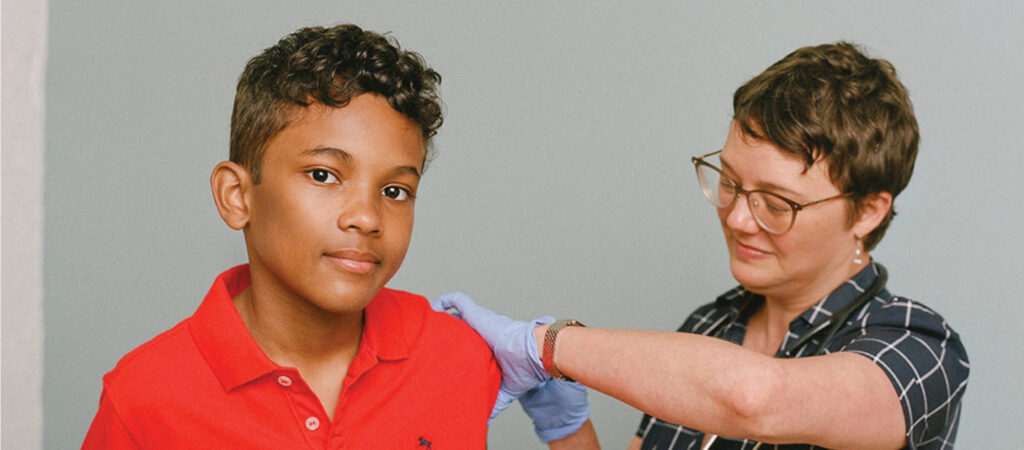All About the HPV Vaccine for Men
Nearly 80 million Americans are thought to be currently infected with HPV (the Human papillomavirus), and approximately 80% of sexually active men and women will get HPV in their lifetime — making HPV the most common sexually transmitted infection (STI) in the U.S. But since HPV is most closely associated with cervical cancer, many men make the mistake of thinking that this STI is not a real threat for them. To make matters worse, there is not an approved HPV test for men, so most guys do not know if they have it anyway.
Although HPV can cause serious health problems for men, there is an easy way to protect yourself — get vaccinated. The HPV vaccine can help reduce your risk for certain types of cancers and prevent the spread of the infection to your sexual partners. Do you want to learn more about HPV and how the vaccine works? Check out this guide that includes everything men need to know about the HPV vaccine.
HPV Risks for Men
Condoms help reduce the risk of getting HPV, but they don’t provide 100% protection against infection. HPV infection typically has no signs or symptoms, though genital warts are caused by certain strains of HPV. Genital warts may clear up on their own without treatment, or may need to be treated with medication or procedures like electrocautery, laser treatment, cryosurgery, or excision.
Nobody wants warts, but other strains of HPV pose a bigger risk: Cancer. Often HPV infections are cleared by the immune system, but sometimes HPV infection persists and can lead to cancer of the penis, anus, or throat (from performing oral sex). In fact, there are more 13,000 HPV-related cancer cases in men each year, approximately:
- 803 causes of penile cancer
- 1,949 cases of anal cancer
- 10,725 cases of throat cancer
The HPV Vaccine for Men
Luckily, there’s a vaccine that protects both men and women from HPV. According to the CDC, cervical cancer rates decreased in the U.S. from 1999 to 2015 due to the introduction of the HPV vaccine. However, rates for HPV-related cancers in men rose during that time, with increases of 2.7% for throat cancer and 2.1% for anal cancer (penile cancer rates remained stable).
The CDC recommends that all boys and girls be vaccinated at age 11 or 12 — before becoming sexually active — thereby providing the greatest level of protection. But if you didn’t get vaccinated as a child, it’s not too late. “Catch-up” vaccines are offered for men through age 21 and through age 26 for those thought to be at a greater risk of infection, including gay or bisexual men, transgender adults, and anyone with an immunocompromising condition, such as HIV.
Over 26? Don’t let that stop you from getting vaccinated. The HPV vaccine (Gardasil 9) is approved for adults through age 45 so talk to your doctor about whether it would be right for you.
Benefits of the HPV Vaccine for Men
The HPV vaccine is safe and effective. If you get the HPV vaccine before becoming sexually active, it can reduce the risk of getting HPV-related cancer by up to 99%. The vaccine cannot treat existing HPV infections or protect against any types of HPV you have already been exposed to. However, it can still provide protection against certain HPV types that you haven’t been exposed to yet.
There have been no reports of severe side effects with the HPV vaccine in clinical trials involving over 15,000 men and women. The most common HPV vaccine side effects include:
- Pain, redness, or swelling at the injection site (arm)
- Dizziness or fainting (more common among adolescents)
- Fever
- Headache
- Fatigue
- Nausea
- Muscle or joint pain
Another benefit of getting vaccinated against HPV is that it reduces the risk of spreading the infection to someone else. Even if the virus does not cause problems for you, it could lead to serious health risks for a partner, including the potential to cause cancer of the cervix, vagina, vulva, penis, anus, or throat. By getting vaccinated, you’re protecting yourself along with your future partner(s).
HPV is incredibly common. Most people who are not vaccinated will get HPV at some point, and it can cause serious health risks. That’s why the HPV vaccine is so important for men. If you want to protect yourself against HPV, ask your doctor about getting vaccinated.
Photo courtesy of Heather Hazzan, SELF Magazine
This blog provides information about telemedicine, health and related subjects. The blog content and any linked materials herein are not intended to be, and should not be construed as a substitute for, medical or healthcare advice, diagnosis or treatment. Any reader or person with a medical concern should consult with an appropriately-licensed physician or other healthcare provider. This blog is provided purely for informational purposes. The views expressed herein are not sponsored by and do not represent the opinions of Nurx™.





